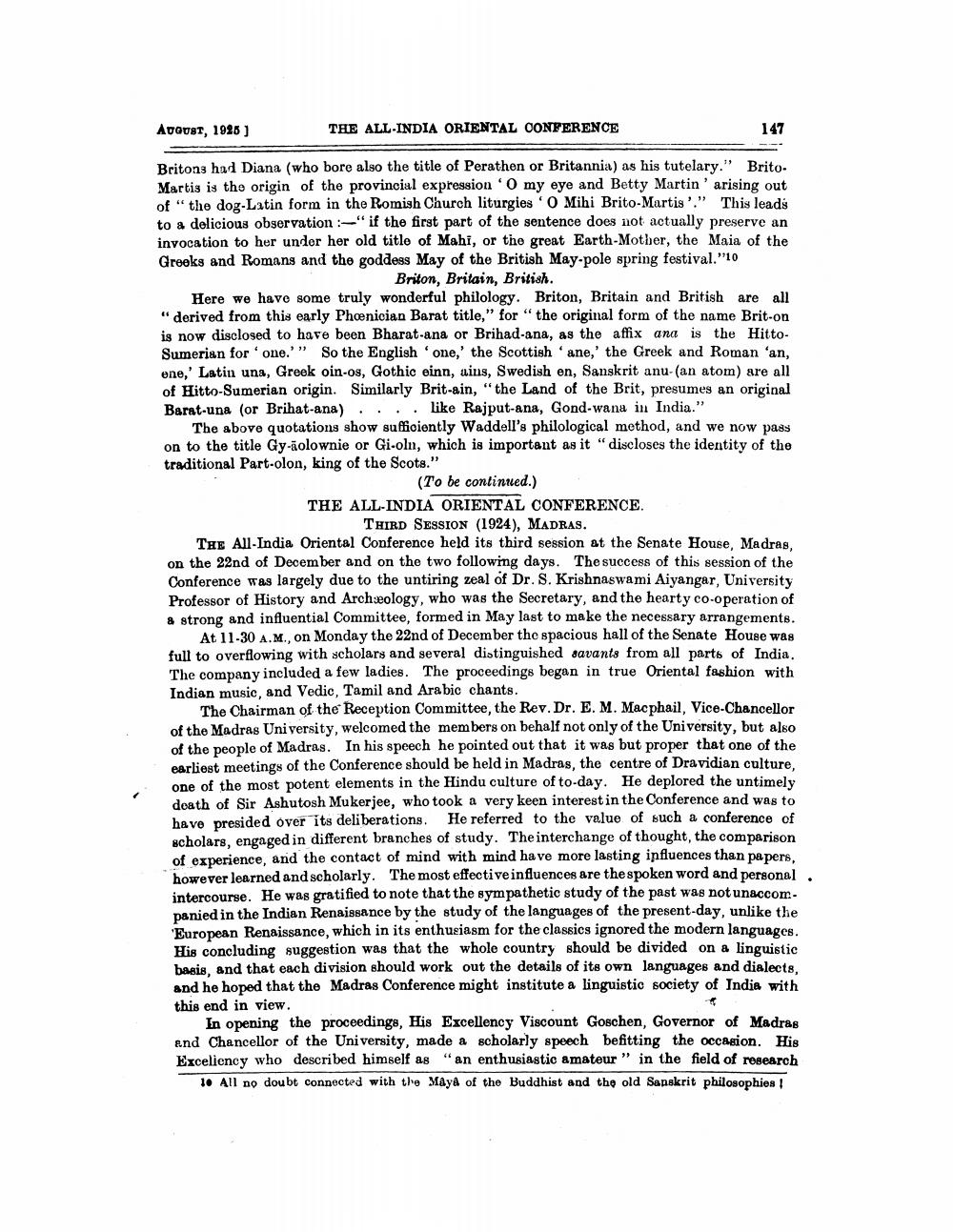________________
August, 1928)
THE ALL-INDIA ORIENTAL CONFERENCE
147
Britons had Diana (who bore also the title of Perathen or Britannia) as his tutelary." BritoMartis is the origin of the provincial expression 'O my eye and Betty Martin ' arising out of "the dog-Latin form in the Romish Church liturgies O Mihi Brito-Martis'." This leads to a delicious observation :-"if the first part of the sentence does not actually preserve an invocation to her under her old title of Mahi, or the great Earth-Mother, the Maia of the Greeks and Romans and the goddess May of the British May-pole spring festival."10
Briton, Britain, British. Here we have some truly wonderful philology. Briton, Britain and British are all " derived from this early Phoenician Barat title," for "the original form of the name Brit-on is now disclosed to have been Bharat-ana or Brihad-ana, as the affix ana is the HittoSumerian for 'one.'” So the English 'one,' the Scottish 'ane,' the Greek and Roman 'an, ene,' Latin una, Greek oin-og, Gothic einn, ains, Swedish en, Sanskrit anu-(an atom) are all of Hitto-Sumerian origin. Similarly Brit-ain, "the Land of the Brit, presumes an original Barat-una (or Brihat-ana)...like Rajput-ana, Gond-wana in India."
The above quotations show sufficiently Waddell's philological method, and we now pass on to the title Gy-aolownie or Gi.oln, which is important as it "discloses the identity of the traditional Part-olon, king of the Scots."
(To be continued.) THE ALL-INDIA ORIENTAL CONFERENCE.
THIRD SESSION (1924), MADRAS. THE All-India Oriental Conference held its third session at the Senate House, Madras, on the 22nd of December and on the two following days. The success of this session of the Conference was largely due to the untiring zeal of Dr. S. Krishnaswami Aiyangar, University Professor of History and Archaeology, who was the Secretary, and the hearty co-operation of & strong and influential Committee, formed in May last to make the necessary arrangements.
At 11.30 A.M., on Monday the 22nd of December the spacious hall of the Senate House was full to overflowing with scholars and several distinguished savants from all parts of India. The company included a few ladies. The proceedings began in true Oriental fashion with Indian music, and Vedic, Tamil and Arabic chants.
The Chairman of the Reception Committee, the Rev. Dr. E.M. Macphail, Vice-Chancellor of the Madras University, welcomed the members on behalf not only of the University, but also of the people of Madras. In his speech he pointed out that it was but proper that one of the earliest meetings of the Conference should be held in Madras, the centre of Dravidian culture, one of the most potent elements in the Hindu culture of to-day. He deplored the untimely death of Sir Ashutosh Mukerjee, who took a very keen interest in the Conference and was to have presided over its deliberations. He referred to the value of such a conference of scholars, engaged in different branches of study. The interchange of thought, the comparison of experience, and the contact of mind with mind have more lasting influences than papers, however learned and scholarly. The most effective influences are the spoken word and personal intercourse. He was gratified to note that the sympathetic study of the past was not unaccompanied in the Indian Renaissance by the study of the languages of the present-day, unlike the 'European Renaissance, which in its enthusiasm for the classics ignored the modern languages. His concluding suggestion was that the whole country should be divided on a linguistic basis, and that each division should work out the details of its own languages and dialects. and he hoped that the Madras Conference might institute a linguistic society of India with this end in view.
In opening the proceedings, His Excellency Viscount Goschen, Governor of Madrag and Chancellor of the University, made a scholarly speech befitting the occasion. His Excelicncy who described himself as “an enthusiastic amateur " in the field of research
1. All no doubt connected with the Mâyd of the Buddhist and the old Sanskrit philosophies !




